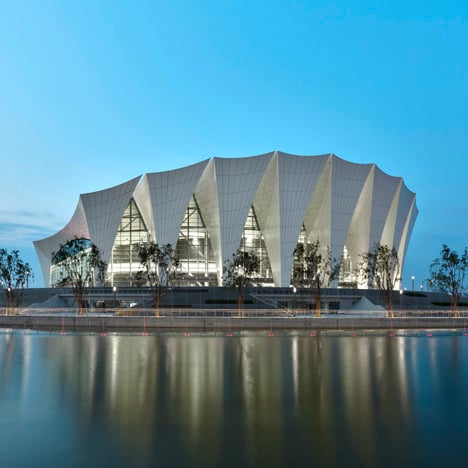
Shanghai Oriental Sports Centre by GMP Architekten
German architects GMP Architekten designed three stadiums for the World Aquatics Championships currently taking place in Shanghai.
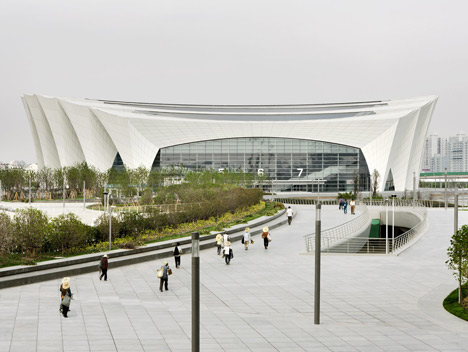
The Shanghai Oriental Sports Centre complex includes a multi-purpose stadium, a dedicated indoor aquatics centre, an outdoor swimming venue and a media centre.
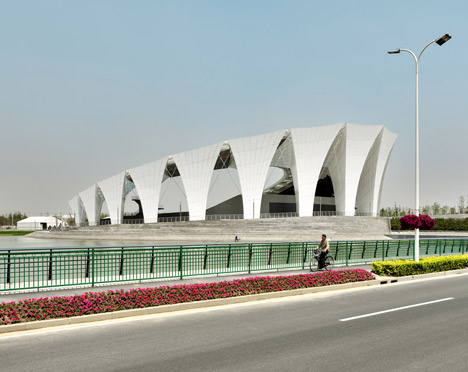
Rows of aluminium sails cover the exteriors of the stadiums, which are raised up on artificial islands and surrounded by newly created lakes.
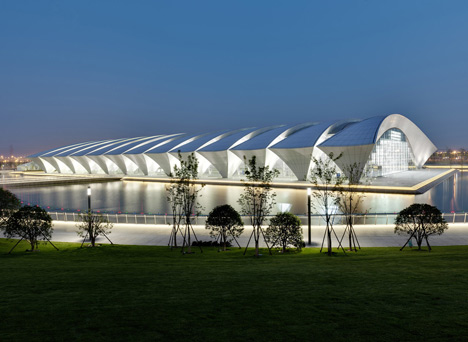
The championships are run by international swimming federation FINA and finish at the end of July.
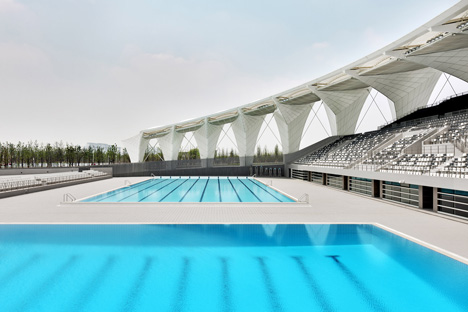
After the event, the main stadium will be used for boxing, basketball, badminton, ice-hockey and concerts.
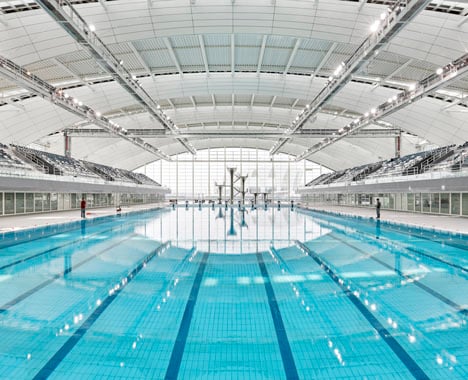
Celebrated sports venue architects GMP also designed three football stadiums for the FIFA World Cup in South Africa last year - see the projects »here.
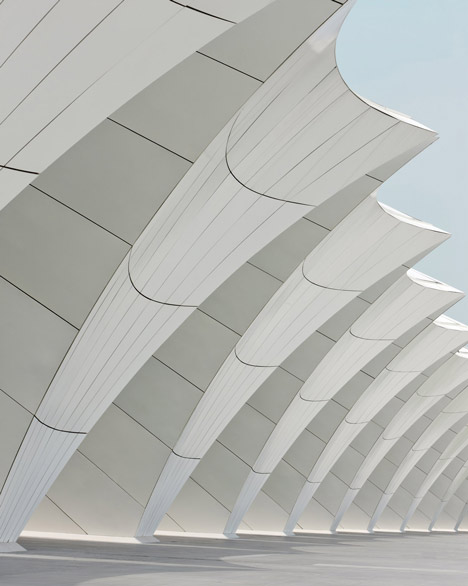
More stories about sports architecture and design on Dezeen »
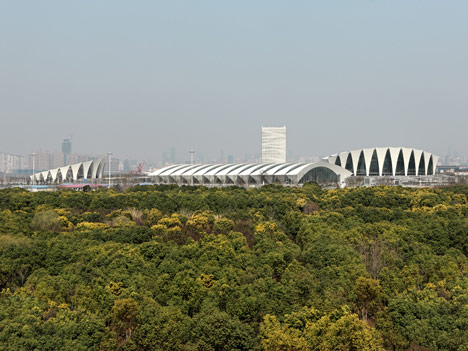
Photography is by Marcus Bredt.
The following information is from GMP Architekten:
Opening of the Shanghai Oriental Sports Center FINA World Swimming Championships, 16th – 31st July
The sports complex was designed and built by architects von Gerkan, Marg and Partners (gmp), who won the competitive bidding in 2008, and constructed it in under two and a half years. It consists of a hall stadium for several sports and cultural events, a natatorium (swimming hall), an outdoor swimming pool and a media centre. In keeping with a sustainable urban development policy, the SOSC was built on former industrial brownfield land along the Huangpu River. The individual venues are designed so that after the Swimming Championships, they can be used for a variety of other purposes.
Water is the overarching theme of both the park and the architecture of the stadiums and the media centre. It is the connecting element between the buildings, which stand on raised platforms in specially constructed lakes. Thus the round stadiums have a curved lakeside shore round them, while the rectangular Natatorium has a straight lakeside shore. Design affinities and a shared formal idiom and use of materials give the three stadiums structural unity. The steel structures of broad arches with large-format triangular elements made of coated aluminium sheet form double-sided curved surfaces along the frame of the sub-structures, thus evoking sails in the wind.
Hall Stadium
During the FINA World Swimming Championships, pool events and synchronized swimming championships will take place in the Hall Stadium, which later can be used for boxing matches, basketball, badminton or ice-hockey matches and concerts. The hall has a crowd-capacity of 14,000, which can be increased to 18,000 by the use of mobile seating.
The main structure of the closed building with a round ground plan consists of reinforced concrete, while the roof is a steel structure with a 170 m span with aluminium cladding. The parallel steel girders create 35 m-high arcades and include the glass façades of the encircling open foyer.
Natatorium
The Natatorium contains four pools arrayed in a row: two standard-sized, one for diving and a leisure pool. It has over 3,500 fixed seats, which will be expanded to 5,000 for the world championships, to meet FINA requirements. The swimming hall is a closed building with a rectangular ground plan, a main structure of reinforced concrete and a roof structure of sectional steel girders. The roof structure with triangular glass surfaces is around 210 m long, 120 m wide and 22 m high. Direct, intrusive sunlight is forestalled by means of narrow toplights along the beams, without preventing natural daylighting.
Outdoor pool
This swimming complex is located in the open on an artificial island and offers 2,000 fixed stadium seats. For the World Swimming Championships and other outstanding events, capacity will be increased to 5,000 seats. The competition-size diving pool and diving towers are complemented by a competition pool. As in the other stadiums, the roof structure with its external diameter of c. 130 m reflects the round ground-plan of the shell of the building. The inner diameter is around 90m. The roof trusses are carried by the building structure. A lightweight membrane between the modules provides protection against sun and rain.
Media centre
The 80 m high high-rise building is on the northern side of the sports complex. Its 15 floors include a fitness centre, conference rooms and medical care centre, plus VIP and office areas. Because of the even 8.4m grid, the building can be used flexibly. With its external shell of white, perforated aluminium panels, the building inter- prets the undulating shape of the adjacent lake.
Competition 2008 – 1st prize Design Meinhard von Gerkan and Nikolaus Goetze with Magdalene Weiss
Project leader - Chen Ying
Team - Jan Blasko, Lü Cha, Lü Miao, Jörn Ortmann, Sun Gaoyang, Yan Lüji, Jin Zhan, Fang Hua, Martin Friedrich, Fu Chen, Ilse Gull, Kong Rui, Lin Yi, Katrin Löser, Ren Yunping, Alexander Schober, Nina Svensson, Tian Jinghai, Zhang Yan, Zhou Yunkai, Zhu Honghao
Structural engineers - Schlaich Bergermann and Partners
International installations - ARUP
Landscaping - WES & Partner
Chinese partner firm - SIADR, Tongji Design Institute
Capacity, Hall stadium - 18,000 seats
Natatorium - 5,000 seats
Outdoor swimming pool - 5,000 seats
Client - Shanghai Administration of Sports
Construction period - 2009–2011